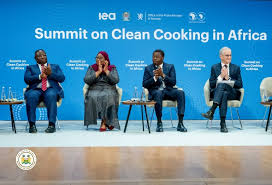By Hassan Osman Kargbo
The Chief Executive Officer of the Clean Cooking Alliance, Dymphna van der Lans, has praised Sierra Leone’s government for its strong leadership in advancing clean energy and climate resilience, describing the country as being “at the centre of Africa’s conversation on climate leadership and inclusive growth.”
Speaking at the Climate Resilience and Energy Transition Dialogue (CRET) 2025 in Freetown, Van der Lans reaffirmed her organisation’s commitment to supporting Sierra Leone’s Presidential Initiative for Climate Change, Renewable Energy and Food Security (PI-CREF) in promoting access to clean, modern, and affordable energy for every household, school, and institution.
“This year’s theme, ‘Mobilising Investment for Climate Action, Food Security, Clean Cooking and a Just Energy Transition for All,’ perfectly captures the integrated approach needed to unlock prosperity while protecting people and the planet,” she stated.
Van der Lans highlighted that **clean cooking is one of the most powerful entry points to achieving sustainable development, noting that transitioning households and institutions from wood and charcoal to cleaner fuels such as LPG, bioethanol, and electricity is not just an energy issue but also a matter of public health, economic empowerment, environmental protection, and climate justice.
She commended the Government of Sierra Leone for launching the National Clean Cooking Strategy, which aims to reach 25 percent of households with clean fuels by 2030 and achieve universal access in urban areas by 2040. The creation of a Clean Cooking Delivery Unit within the Office of the President, she said, marks a “historic milestone” that ensures coordination at the highest level of government.
However, the Clean Cooking Alliance CEO stressed that strategies must be backed by concrete action. She called for stronger financing, innovation, and partnerships, adding that initiatives such as Mission 300 and the Country Partnership Framework with the OPEC Fund could attract catalytic capital, de-risk private investments, and create local jobs particularly for women and youth.
“The Clean Cooking Alliance remains committed to working with the Government of Sierra Leone, private sector actors, and development partners to scale investments in modern cooking solutions, strengthen local market systems, and attract climate finance,” Van der Lans assured.
She concluded by commending the government’s vision through PI-CREF, expressing optimism that Sierra Leone could become a model for people-centred, climate-smart energy transition in Africa.
“The children growing up in Freetown and elsewhere in Sierra Leone deserve to breathe clean air, learn under electric light, and grow up in communities that thrive sustainably,” she said. “That is the future this dialogue is helping to build.”













